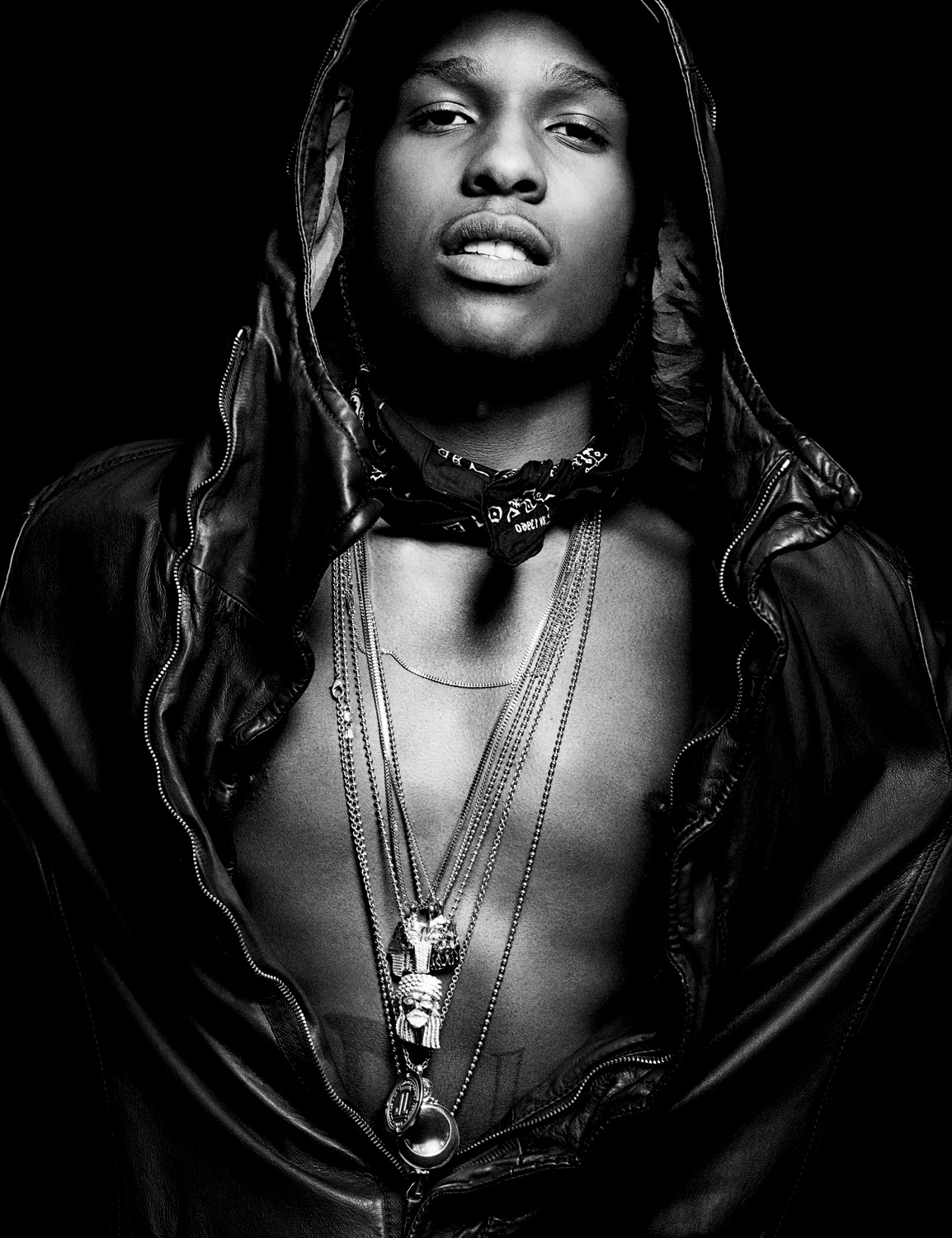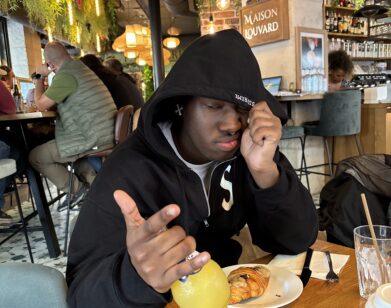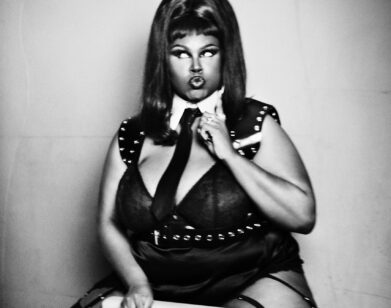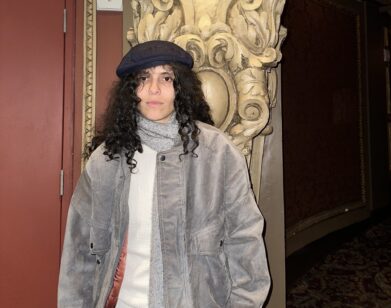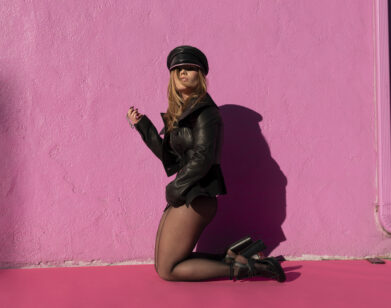A$AP Rocky
I’ve been into fashion since birth. I grew up in the ’hood, and everybody in the ’hood wants to compensate for being in poverty, so they want to look good.A$AP Rocky
A$AP Rocky’s ferociously energetic mix tape Live.Love.A$AP quickly caught fire with hip-hop heads, music bloggers, and nominal tastemakers when he unleashed it on the world via the Internet last fall. In fact, the furor was so great that large numbers of those most standoffish of record-industry gatekeepers—A&R people—soon found themselves frothed up and in a tizzy over the 23-year-old Harlem-bred rapper’s peculiar blend of influences, which include Southern regional hip-hop styles (like the slowed-down, doped-out beats of the Houston subgenre of screw music) and the world of high fashion (who was the last rapper to name-check Rick Owens?).
Born Rakim Mayers, Rocky endured the kind of troubled childhood that most kids don’t escape: his father went to jail in connection with selling drugs, his older brother was killed, and Rocky wound up shuffling through shelters with his mother and sister for a time. But Rocky’s single-minded confidence enabled him to not only survive, but thrive with good-humored ease and few hints of bitterness about his past. He is part of a large uptown crew, all of whom use the first name of A$AP, which stands for Always Strive and Prosper. Until recently, he himself was dealing drugs in order to pay his bills, but he just signed a record deal with Polo Grounds Music, a label under the Sony-RCA banner, for a reported $3 million—which, for an artist whose music is rife with the steadfast ambition to uplift and transform reality, should allow him, on some level, to do just that.
Despite the grimy, smoky braggadocio of songs like “Purple Swag” and “Peso,” Rocky exudes an infectious positivity. When we sat down to do this interview at a photo studio in a cavernous industrial building in the South Bronx, he was wearing a more traditional hip-hop uniform: black shirt, black jeans, black boots, and a black wool hat accented by gold fronts on his lower teeth. The only hint that he knows his Rei Kawakubo from his Yohji Yamamoto was the logo stitched on the front of his cap: COMMES des FUCKDOWN.
At, like, 13 I started selling weed. By 14, 15 I was selling crack in the Bronx . . . So that was my life for a few years.A$AP Rocky
DIMITRI EHRLICH: Let’s talk a bit about your childhood. When you think about growing up, what sort of images pop in your head? I know that you spent the first part of your life in Harlem.
A$AP ROCKY: Yeah. When I was a kid, we lived at 116th and Morningside.
EHRLICH: I remember that neighborhood, around Morningside Park, being full of crack zombies back in the 1980s.
ROCKY: Oh, it was crazy . . . I want to say it was real hip-hopish when I was growing up. You know what I’m saying? But we lived in Pennsylvania, where my dad was, for a good three years, too. I moved there when I was 8 and left when I was 11. I grew up on 116th Street, in the Bronx, then on 140th Street in Harlem. I was back and forth between New York and Pennsylvania. Like, I would live in New York the whole summer and go back and forth. So it was one of those things . . .
EHRLICH: Your dad went to jail when you were 12 for selling drugs. What sort of impact do you think that had on you?
ROCKY: Well, it fucked me up, man. When my dad was gone, times became really hard for my family.
EHRLICH: You started living with your mom in shelters.
ROCKY: Yeah . . . That shit was tough.
EHRLICH: Where were these shelters?
ROCKY: One of them was in North Carolina. It was just like a big-ass fucking gym full of bunk beds and random people and strangers bunking with each other with a big-ass bin on the edge of the bed where they put their clothes. Me and my sister just looked at each other and started crying . . . We moved down there because my mom wanted to get with her high-school sweetheart, or something like that. To make a long story short, she went down there to try to start a new life. My father had made a bunch of babies with her, he was caught up in the street life, and he ended up going to jail, so she was hurt and alone. I don’t know what made her decide to go into a shelter, but she just wanted to get away from the life she was in. She was with this guy who kind of fucked her life over . . . Then my aunt let us live with her for a while, which was pretty hard because it was like an upper-middle-class kind of neighborhood, so I didn’t get along with any of the kids. They used to pick on me and tease me and make fun of me at the bus stop. When I went to school, all my friends were the kids from the poor neighborhoods. My mom ended up getting a job, and we moved to some projects. But then she got into a fight with an employee, and after that she lost her job, so we weren’t going to be able to afford to stay in that place anymore. Eventually, she decided to come back to New York, where we lived in another shelter. After school, my friends were like, “Yo, Rocky, let’s go to your house.” But I’d just be like, “Nah, man, I can’t have company.” I was ashamed to let anyone know that I was living in a shelter. I remember one time coming home and some kids saw me and were like, “What you doing here? This is a shelter!” But I was like, “My mom’s working there.” It was pretty embarrassing. It’s something to laugh about now because it’s what made me who I am, and I didn’t have any say-so in that. I was a child. I couldn’t do too much . . .
EHRLICH: You lost your older brother when you were 13. What kind of influence did he have on you? What was his name?
ROCKY: His name was Ricky, and I just . . . I mean, I wanted to be him. He had braids. He used to listen to Bone Thugs-n-Harmony. He was into girls. He was more of a fighter, though. He was kinda crazy.
EHRLICH: How much older than you was he?
ROCKY: He was seven years older.
EHRLICH: So what happened?
ROCKY: He got shot—on the block where I was born, 116th Street.
EHRLICH: Later, you started dealing drugs.
ROCKY: At, like, 13 I started selling weed. By 14, 15 I was selling crack in the Bronx . . . So that was my life for a few years. Then when I was 21, I moved to my mom’s out to New Jersey.
EHRLICH: When did you stop selling?
ROCKY: I stopped around Memorial Day . . . It’s been hard, and it got harder last summer. I was kind of broke and had to really be strong because we were really striving to be independent, you know what I mean? But now money is not really a big issue. I’m just focused on life right now. I’m having fun with this music shit and my career.
EHRLICH: So now you’re 23 years old, you’ve just signed a $3 million deal, and your life has been transformed in a dream-come-true way. How does that impact your ambition and your happiness?
ROCKY: It helps. [laughs] I mean, I’ve always been content, but I’m just ready to work hard. I got a great team behind me, a great label. It’s time to get crazy.
I don’t try to please anybody because then I will lose focus on what I’m really here to do. My MUSIC is tastemaker shit. It’s the future.A$AP Rocky
EHRLICH: How did you get into fashion?
ROCKY: I’ve been into fashion since birth. I grew up in the ’hood, and everybody in the ’hood wants to compensate for being in poverty, so they want to look good to keep themselves up. That’s been embedded in me. My father, he kept me in the Jordans and Guess stuff and all that other shit, so it was just like I grew up on that fashion shit. It’s just that my fashion tastes changed and shifted, that’s all.
EHRLICH: But the fashion sensibility in Harlem has always been very flashy, whereas when you were in high school, you were going to SoHo to find things you liked in thrift stores. How did you educate yourself about fashion in that way?
ROCKY: It’s kind of like one of those things where you just research one thing that you come upon, and it’s easy once you get into it. The hard part is putting it all together. It’s, like, everybody from Harlem knows what Gucci is—I mean, Dapper Dan up in Harlem was big even though that wasn’t officially Gucci—but if you shop at Gucci, you say, “Okay, where can I get Gucci from? Okay, I can get it from Saks Fifth.” So when you go to Saks Fifth, you see nice shit, you see other name brands, and then you gotta do your research. I grew up in the age of the Internet. You look up the designer, see when they have their shows, and what lines they bringing up. I mean, I’m not gonna say I went on the Internet to find everything. It was just something that me and my crew used to do. We used to wear what we felt would make us look different.
EHRLICH: You were embracing being peculiar or odd relative to the mainstream, which is hard when you’re 15 or 16 because what most kids want to do is just fit in.
ROCKY: Of course. I didn’t want to be a loser, but I didn’t want to fit in at the same time because I don’t like just being ordinary. So it’s one of those situations where I always kept my head up. I thought highly of myself growing up. I still do. There’s not really much somebody can say to me to bring down my confidence or anything. We know our shit stink, but you can’t tell us that because we feel like we do what we do. Fuck your laws, fuck your rules and boundaries and limits. We do us.
EHRLICH: Something else that has set you apart is that you’ve been very outspoken about the fact that your interest in fashion—and admiration for so many of the great designers—opened your eyes to the homophobia that still exists in hip-hop. We’re living in a time where a lot of things are changing rapidly, but one of the holdouts seems to be the antigay slurs that are still widespread in hip-hop.
ROCKY: Well, I haven’t been a gay activist. I haven’t protested for gay rights or none of that, but one thing I can say is that a lot of the designers I wear are gay and I like their clothes. Why can’t I be friends with somebody who’s gay? Why not? You can miss out on a lot by being so small-minded and stereotypical about people. It’s stupid. Who people like is their own business. It don’t concern me. I know what I do—and I’m having a lot of fun with the women that I’m with.
EHRLICH: Hip-hop is also a world of surf and turf, and you’re a vegetarian. Why did you decide to give up meat?
ROCKY: I’m a pescatarian. I eat fish. I’m not one of those people who is an animal-rights type of person, because I like minks and furs and chinchillas and shit. It’s just, they keep those animals confined in these small cages where they inject them with all these hormones and steroids and shit so that they can be big and someone will pay more money for them. But that shit is no good for you. I also just recently stopped eating candy. Next I’m gonna try to part with liquor and start exercising more. It’s just, like, I’m young now, but I’m getting old quickly, just like everybody else, and I just want to make sure that by the time I’m 40, I don’t have back problems and dumb shit going on with me because I was wildin’ when I was younger.
EHRLICH: So it’s more like a health thing?
ROCKY: Yeah, I decided that I wanted to cleanse my mind, body, and soul. I felt that I didn’t want to eat nothing else that was really living, that can bleed and breathe and run and make noises. I’m gonna give up fish soon. It’s really hard, but I believe in it.
EHRLICH: It is hard. I tried.
ROCKY: For how long?
EHRLICH: For like three months, but I like to exercise a lot and, maybe I’m wrong, but I found that I was craving turkey, so I would have turkey and then it’s a slippery slope. There is something about when you eat a steak or a burger . . . Your mouth is watering.
ROCKY: This gum I’m chewing? I’m pretending it’s steak right now.
EHRLICH: Steak-flavored gum.
ROCKY: That’s some Willy Wonka shit.
I thought highly of myself growing up. I still do. There’s not really much somebody can say to me to bring down my confidence or anything.A$AP Rocky
EHRLICH: I read something in The New York Times where you said that you don’t really like New York rappers—
ROCKY: That’s not true. It got misconstrued. I was saying that there are a lot of rappers that are coming up with me in New York that I can’t really relate to.
EHRLICH: You mean the new generation?
ROCKY: The current one, yeah . . . . But there are New York rappers that are dope, too. The old guys are holding it down.
EHRLICH: When “Purple Swag” first came out, it wasn’t really embraced in New York. How did you feel about that?
ROCKY: At first, it was embraced everywhere else, but New York was kind of hesitant—reluctant . . . But even now, I don’t try to please anybody because then I will lose focus on what I’m really here to do, which is make my music. My music is tastemaker shit. It’s the future.
EHRLICH: So what’s the next step?
ROCKY: I’m gonna have to say the top. The top is gonna be the next step. I mean, we’re already there, but I’m talking like the tippy-top. The tippy-tip-top.
Dimitri Ehrlich is a contributing music editor for Interview
Click here to download tracks from A$AP Rocky’s official website.

